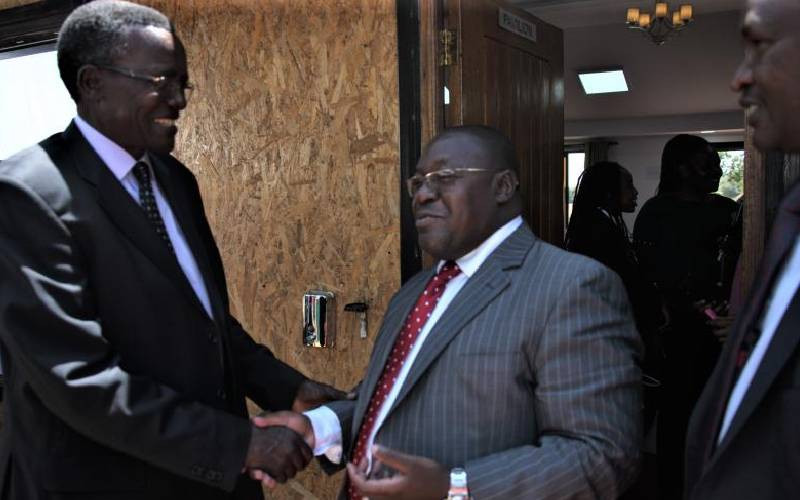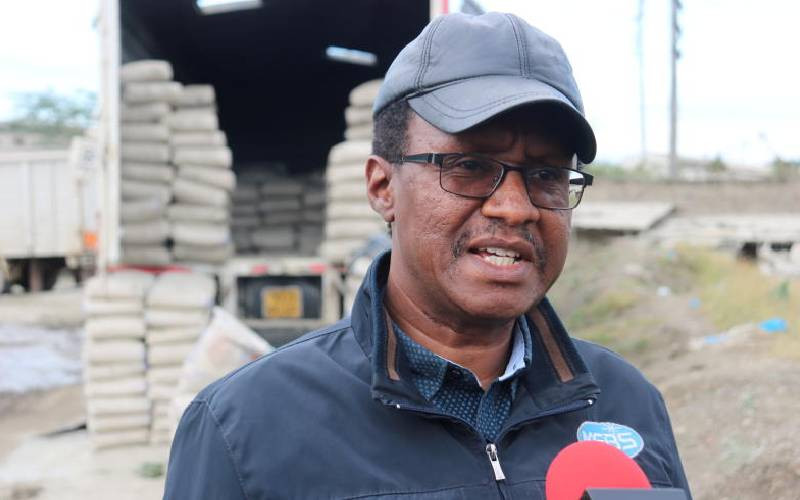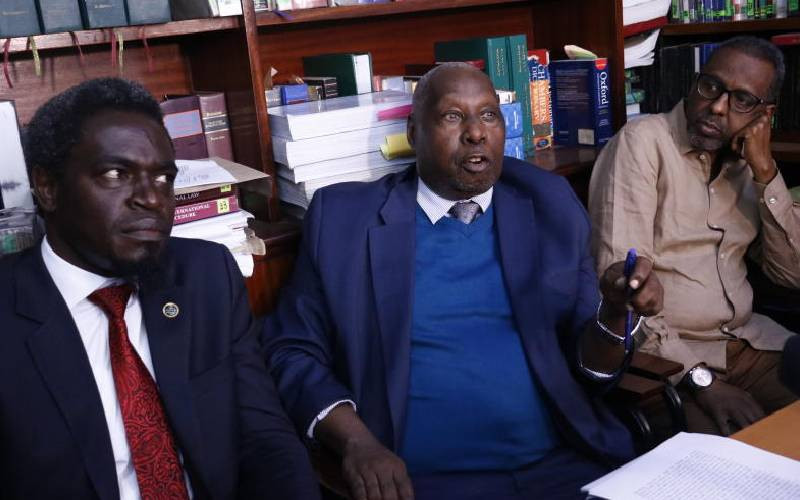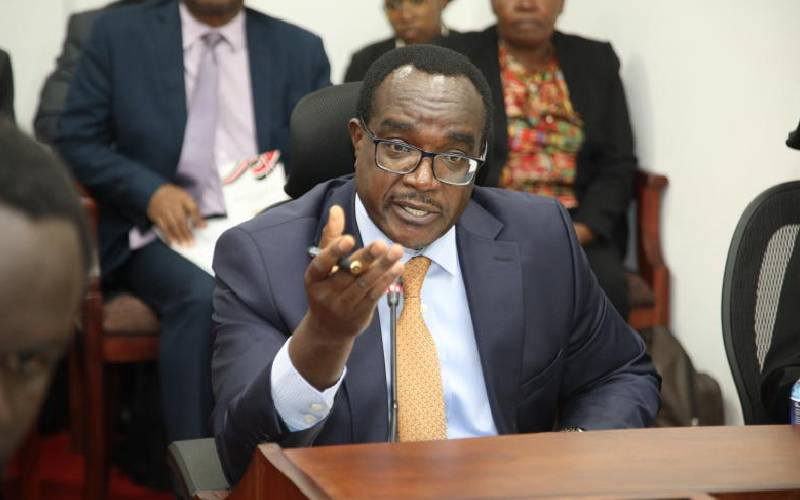
A recent report by the Maraga Taskforce has unveiled a disturbing trend of sexual harassment, including rape and coercion, among officers in the Kenya Police Service (KPS), Kenya Prisons Service, and the National Youth Service (NYS).
The report of the National Taskforce On Police Reforms highlights a culture of silence, with many victims fearing job loss and retaliation for reporting abuses.
The Maraga report indicates a significant lack of understanding of what constitutes sexual harassment among officers, many of whom do not report their experiences due to the perceived futility of such actions.
Pregnant women are particularly vulnerable, often targeted for sexual favours in exchange for light duties. If they refuse, they may be assigned heavier workloads.
“Depressing reports were recorded of cases where expectant female staff are not allocated light duties or are required to provide personal medical information to get time off, or are victimised for rejecting sexual advances from senior officers,” the report states.The Taskforce’s findings suggest that the existing work environment is hostile, especially for female officers, who are targeted by both senior and junior officers.
The layout of police stations and camps further exacerbates the risks, creating conditions where harassment is normalised. Despite the existence of mechanisms to address sexual harassment, victims feel these systems are inadequate, with few perpetrators facing sanctions.
“Ultimately, sexual harassment of volunteers and junior officers has been normalised within the service,” the report asserts. Women officers in all three services report being subjected to unwanted sexual advances, coercion, and even rape by their supervisors or colleagues. “This type of behaviour creates a hostile environment that makes it difficult for women to participate fully in the programme and achieve their goals,” the report notes. Additionally, many members of the Service lack awareness of what constitutes sexual harassment or how to report it.
The Taskforce found that existing mechanisms for addressing sexual and gender-based violence (GBV) have not been effectively communicated to those at risk.“It was submitted that KPS, Kenya Prisons, and NYS have systems for reporting incidents of sexual harassment, but these systems are often inadequate,” the report states. The report highlights that many officers do not know the proper procedures for reporting gender-based complaints, as the policy on sexual harassment has not been widely publicized.
“Often, most of the officers do not know the process of reporting and processing gender-based complaints because the policy on sexual harassment has not been adequately publicised,” the report notes.
Moreover, perpetrators often go unpunished due to failures in reporting, lack of evidence, inadequate investigations, and a lack of consequences for those found guilty.
The Taskforce further discovered that the Services are ill-equipped with resources, including staffing, funding, and training, to effectively support victims of GBV. This leads to long wait times for assistance and limited counselling options.
“Effectively, members of the Service do not have a complaints channel if they are subjected to abuse or harassment,” the report says, emphasising the absence of female representation in some field units.
A deeper analysis of the data reveals a stark underrepresentation of female officers in leadership roles within the Services. While there has been a rise in female representation in certain middle-ranking positions, women remain vastly underrepresented at higher ranks, with only 39 percent in the Senior Superintendent category.
“The perception is that many members of the Service do not understand the boundaries of acceptable conduct, which perpetuates unreported cases of harassment,” the report explains.
The Taskforce has called for enhanced mechanisms to address sexual harassment, including establishing anonymous reporting systems to encourage victims to come forward without fear. Officers have suggested that thorough investigations should precede any actions taken to mitigate false reporting. Victims should also receive professional counselling during the investigation process.
Moreover, the officers recommend limiting strict adherence to the chain of command to facilitate reporting and the establishment of SGBV offices with both male and female representatives. Suggestions also include separating senior and junior officers’ quarters, installing CCTV cameras, and developing a comprehensive workplace policy on sexual harassment.
Despite the reported prevalence of sexual harassment, the National Police Service lacks a clear mechanism for addressing these issues. During the Taskforce’s investigations across various stations, female officers spoke candidly about their experiences with sexual harassment and GBV, often from both junior and senior colleagues. From 2018 to 2022, there were only 22 documented cases of sexual harassment within the National Police Service, which indicates significant underreporting given the widespread nature of the problem.
The Taskforce identified systemic failures within the Services that have thwarted efforts for transformation over decades. These issues include endemic corruption, favouritism, and political interference, which have undermined public confidence.
“Corruption in nearly every aspect of the Services’ affairs has significantly affected professionalism and rendered them almost dysfunctional,” the report concluded.
The prevailing sentiment among officers regarding transfers reflects deep-seated issues of nepotism and corruption, with many feeling that meritocracy is often overlooked.
“While there are mechanisms to address this vice, the victims of sexual harassment feel that these mechanisms are inadequate as very few perpetrators are sanctioned for their actions,” the report said.
Officers expressed frustration over inadequate appeal mechanisms against unjust transfers, which they deem inadequate or entirely unknown to them.
“Further, the perception of the Taskforce is that members of the Service do not understand the boundaries of what is decent and what could amount to sexual violence or harassment. As such, many cases of the vice go unreported, which perpetuates the practice within the Service. Primarily, this may be attributed to lack of a comprehensive Sexual Harassment Policy in the Service,” the report said.
In light of these findings, the Maraga Taskforce has made several recommendations to address the rampant sexual harassment within the Services.
“Establishing an anonymous reporting system and creating SGBV offices with adequate staffing are among the key proposals. Additionally, installing surveillance systems and developing a comprehensive policy on workplace harassment are critical steps recommended for fostering a safer environment for all officers,” the report said.
The report also underscores the challenges faced by police centres designed for SGBV victims, which struggle with sustainability and resource allocation. Gender desks within the Services often lack trained staff and essential tools, leading officers to view them as low-priority.
 The Standard Group Plc is a multi-media organization with investments in media platforms spanning newspaper print
operations, television, radio broadcasting, digital and online services. The Standard Group is recognized as a
leading multi-media house in Kenya with a key influence in matters of national and international interest.
The Standard Group Plc is a multi-media organization with investments in media platforms spanning newspaper print
operations, television, radio broadcasting, digital and online services. The Standard Group is recognized as a
leading multi-media house in Kenya with a key influence in matters of national and international interest.











